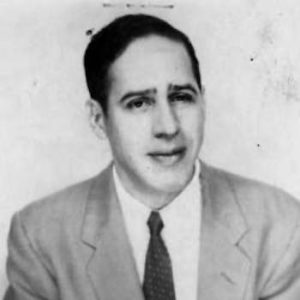
Bubbling BrownSugar (poster)
Loften Mitchell was born on this date in 1919. He was a Black playwright, historian, and writer.
His parents were Ulysses Sanford Mitchell and Willia Spaulding Mitchell, from Columbus, North Carolina. In addition to having three brothers, he had one sister, Gladys. The family moved to Harlem before young Mitchell was a month old. His first stage productions were the shows that he and his brothers Louis, Melvin, and Clayton performed in the backyard of their home in Harlem.
Mitchell's further interest in the theater began at the vaudeville theaters of Harlem. He learned first-hand the promise of Black theater as he observed at work such pioneering Black artists as Dick Campbell, Ralph Cooper, Ethel Waters, Fredi Washington, and Canada Lee. He also witnessed the negative stereotypes of African Americans in the American theater and later worked to remove such images to project real-life, positive images.
Mitchell enrolled in New York Textile High but transferred to DeWitt Clinton High, where he graduated with honors in 1937. To support himself, he found work as an elevator operator and delivery boy. At the same time, he studied playwriting during the evening at City College of New York and performed with the Rose McClendon Players in Harlem. A professor from Talladega College in Alabama helped him win a scholarship to study there, and Mitchell received his B.A. degree with honors in 1943.
Mitchell married Helen Marsh that same year, and they had two sons, Thomas and Melvin. They were divorced in 1956. While at Talladega, he won an award for the best play, which included the stories he had heard at the vaudeville houses while growing up in Harlem. It became the basis for his critical work, later published in 1967, Black Drama: The Story of the American Negro in the Theater. After two years in the U.S. Navy during World War II, Mitchell enrolled as a graduate student at Columbia University in New York.
In 1948, he accepted a job with the Department of Welfare as a social investigator but continued to study during the evenings. He wrote Blood in the Night in 1946, followed by The Bancroft Dynasty in 1948 and The Cellar in 1952. In 1957, he wrote A Land Beyond the River, a drama based on South Carolina pastor and schoolteacher Joseph DeLaine's historic court case, which ended segregation in public schools.
Mitchell won a Guggenheim award the following year, which enabled him to return to Columbia and write for a year. Mitchell worked as a writer and actor for New York radio station WNYC's weekly program The Later Years (1950--1962). He also wrote a daily program titled Friendly Advisor for the radio station WWRL in New York (1954).
A series of plays followed: The Photographer, 1962; Ballad of Bimshire, 1963; Ballad for the Winter Soldiers, 1964; Tell Pharaoh, which was televised in 1963 and produced on-stage in 1967; and Star of the Morning, 1965. Mitchell's most thriving musical was Bubbling Brown Sugar, 1975, written with Rosetta LeNoire. It opened on Broadway, traveled to London, was nominated for a Tony Award for Best Musical, and was awarded the Best Musical Award in 1977.
He also wrote Cartoons for a Lunch Hour 1978, A Gypsy Girl 1982, and Miss Ethel Waters 1983. Mitchell never lost sight of the need for a written history of Blacks in the theater. He wrote Black Drama in 1967. In this collection of 12 essays, Mitchell discussed Charles Gilpin's work in Eugene O'Neill's Emperor Jones at the Provincetown Theatre in 1920. Mitchell was a professor at the State University of New York at Binghamton's theater department and the Department of African American Studies (1971--85) and professor emeritus from 1985 to the present. In addition, he wrote a novel, The Stubborn Old Lady Who Resisted Change (1973), and edited Voices of the Black Theater (1976). He won a playwriting award from the Research Foundation, State University of New York (1974), and the Outstanding Theatrical Pioneer Award from the Audience Development Committee in 1979.
He married Gloria Anderson in 1991. An important figure who has made significant contributions to the African American theater, Loften Mitchell's work as a playwright and essayist preserves the work of Black artists who preceded him and those whose genius, talents, and pioneering efforts were realized during his lifetime.
Loftin Mitchell documented an important part of Black America's cultural development and contributed to that development through his written work. He died in Queens, New York, on May 14, 2001.
Contemporary Black Biography, various volumes
Edited by Shirelle Phelps
Copyright 1999 by Gale Research, Detroit, London
ISBN 0-7876-1275-8